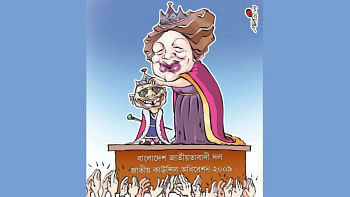'Judicial divorce' as exit

Present Muslim divorce Laws in Bangladesh allow husbands to pronounce divorce unilaterally. The only restriction imposed on this unilateral exercise of power is to serve notice to the wife according to section 7 of the Muslim Family Laws Ordinance, 1961 and for non-compliance therewith, penal provisions are inserted in that law. But this does not impose any substantial restriction upon the husband to pronounce divorce to the wife. Conversely, the present substantive criminal laws for crimes towards women are comparatively rigid. For example, offences under Dowry Prohibition Act, 1980 and Nari- Shishu Nirjaton Domon Ain, 2000 are mostly non bailable.
Divorce in Bangladesh is considered as a stigma for women. Specially, after the birth of the issue in the family, if husband pronounces divorce, it becomes difficult for the wife to survive in the society, both financially and socially. As a result, the criminal laws are used as a shield to create pressure to their husband so that he can continue with his conjugal life. It is not difficult to find many cases in courts in Bangladesh where a wife is filing cases against the husband and his family members for torture and dowry demand even after pronouncement of divorce by husband. Subsequently, when husband and his family shift their stand from divorce, wife seeks to withdraw the case and continue the conjugal life.
As a result of this duel stand of divorce law (Soft) and Criminal law (Hard law), the consequence becomes terrific. On one hand, thousands of divorces get pronounced every day and on the other hand, millions of criminal cases stay pending before Chief Judicial Magistrate Courts, Nari O Sishu Nirjatan Domon Tribunals and Family Courts in Bangladesh.
Whether we will allow this duel standard and coincide with the continuation of this current practice or not is an important question to deal with, in this backdrop. The consequences of continuation of this current practice are multi-faceted. Firstly, it endangers the matrimonial relationship between husband and wife, as the wife is always at risk of unilateral pronouncement of divorce by husband. Secondly, this pushes women in Bangladesh within the court boundary with claims founded on criminal charges. Thirdly, there are thousands of criminal cases pending before Magistrate Court and Nari O Sishu Nirjatan Domon Tribunal and the true cause of action arises out of the pronouncement of divorce. Finally, this situation also engages a large number of women in Bangladesh for criminal charges, who are mostly family members of husband like mother, sister, sister in law.
So what should be our starting point to resolve this problem? A solution may come through 'Judicial Divorce' system, which is still within our legal system. Section 5 of the Family Courts Ordinance 1985 says that divorce is also one of the jurisdictions of the Family court. Under that provision, sometimes, wife files divorce case before family court under Dissolution of Muslim Marriages Act, 1939, when husband did not delegate divorce power to wife or there is no mutual divorce between them.
Sometimes, husband files divorce case before family court in order to avoid other legal difficulties. But, in rest of the cases, mostly husbands pronounce divorce through serving notice to Union Council and to opposite party as legal requirement of section 7 of Muslim Family Laws Ordinance, 1961 and the divorce is executed through registration of divorce under Muslim Marriage and Divorce Registration Act, 1974.
In most of the cases wives also pronounce divorce through exercising her delegated power (Talak E Tafiz) and the execution of divorce is almost same (service of notice and registration before Nikah Registrar). As a result a large number of divorce cases both by husband and wife are executed in Bangladesh without going to court. But, for subsequent claims of both the parties like dower demand, maintenance of child, guardianship of child, restitution of conjugal rights, both the parties often go to the court. Even after divorce, wives files different criminal cases against husband in order to create pressure and to resolve other marital claims.
Here, 'Judicial Divorce' would be the best way of exit from family relations, and at the same time, other related issues like dower demand, maintenance, custody of the child, restitution of conjugal rights would be dissolved along with this divorce case before court. It would not be necessary for the wife to file criminal cases for creating pressure upon the husband to reconsider his decision of divorce, as the wife would get the forum to defend the divorce decision.
The writer studied LLM in International Commercial Law at University of Glasgow.

 For all latest news, follow The Daily Star's Google News channel.
For all latest news, follow The Daily Star's Google News channel. 



Comments